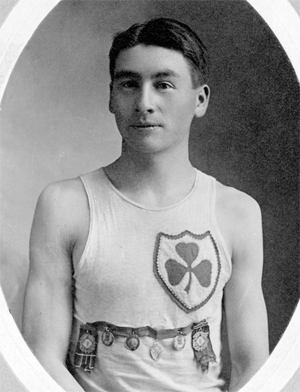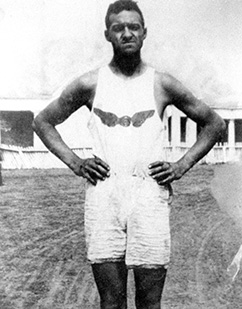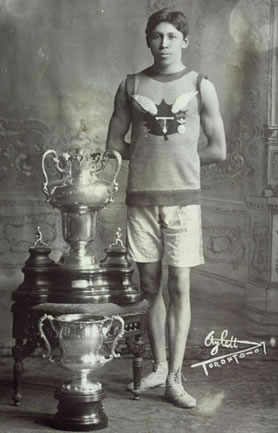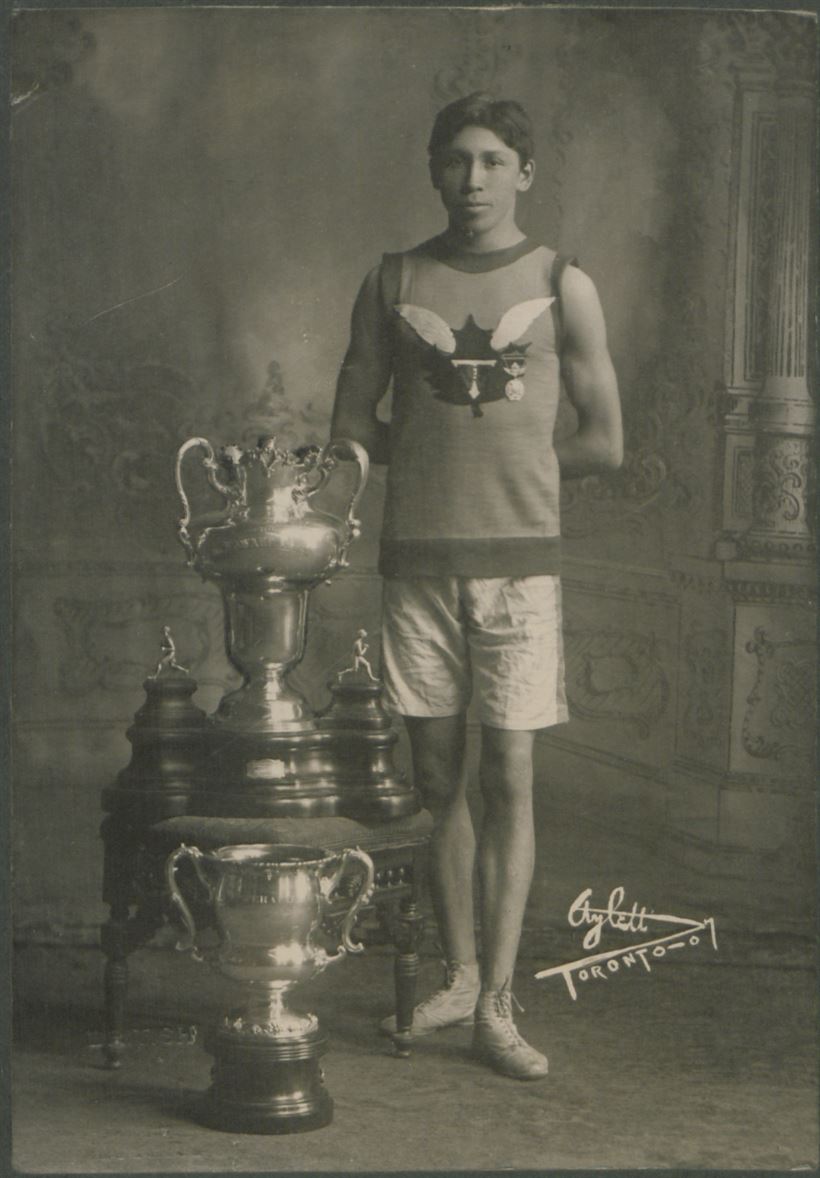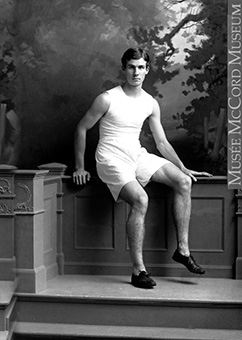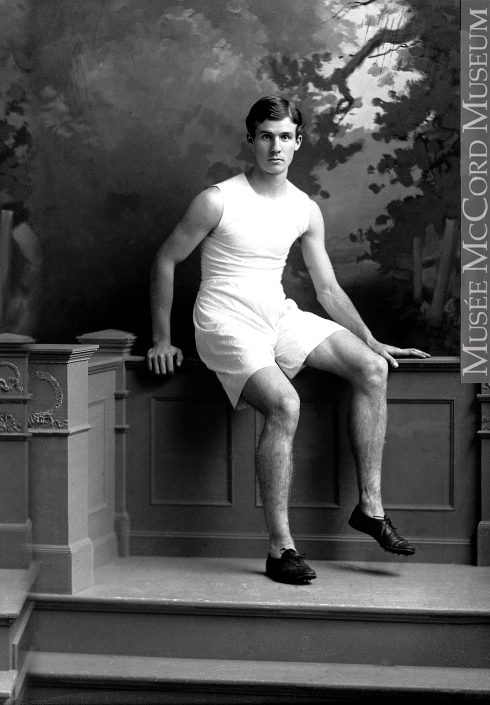Olympians 1900-1919
Alexander Decoteau - Canadian Soldier Olympian
Alexander Decoteau was a Cree born on the Red Pheasant First Nation in Saskatchewan in 1887. He moved to Alberta as a young man where he would become our country’s first Aboriginal-Canadian police officer when he joined the Edmonton force in 1909. A remarkable long-distance runner, he won most of the major races in Western Canada during his athletic career. He was selected to compete in the 5,000 metre race at the 1912 Olympics in Stockholm, Sweden. He made it to the finals but unfortunately suffered leg cramps and finished out of the medals.
With the First World War raging, Decoteau enlisted in the Canadian Army in 1916. This did not stop him from running, however, and he won the five-mile race during a military sports day in England. King George V was watching and awarded him his personal gold pocket watch as a prize. Tragically, Private Decoteau was killed in October 1917 during the Battle of Passchendaele. It is said that the German sniper who shot him took the special watch but Decoteau’s comrades later killed the sniper, recovering the treasured memento and sending it home to Decoteau’s mother.
Decoteau was inducted into the Edmonton Sports Hall of Fame in 1967.
James Duffy - Canadian Soldier Olympian
James Duffy was born in Ireland in 1890 and grew up in Edinburgh, Scotland before emigrating to Canada in 1911. An elite young runner back in Scotland, he started competing in long-distance races in Ontario soon after his arrival in the country. He earned the right to represent Canada in the marathon at the 1912 Olympics in Stockholm, Sweden where he finished in fifth place.
He continued to run after the Olympics, at one point winning an impressive string of seven straight marathons. In April 1914, he won the Boston marathon in a time of 2:25:14. Later that same year, the First World War erupted and Duffy quickly enlisted in the Canadian Expeditionary Force.
Private Duffy was among the first Canadian soldiers to see combat when his 16th Canadian Infantry Battalion (Manitoba Regiment) took part in heavy fighting near Ypres, Belgium on April 23, 1915. This was part of a larger battle that saw the Canadians courageously hold the front line after the Germans used poison gas for the first time. Sadly, Duffy was killed by shrapnel during a night time counter-attack at Kitcheners’ Wood. He is buried at the Vlamertinghe Military Cemetery in Belgium.
John Armstrong “Army” Howard - Canadian Soldier Olympian
John Armstrong “Army” Howard was born in Winnipeg on October 6, 1888.
Howard took up track and field and dominated sprinting competitions in our country from 1912 to 1915. The Black Canadian athlete overcame the barriers thrown up by the less inclusive society of the day to qualify for the 1912 Olympic Games in Stockholm, Sweden. Unfortunately his medal hopes would be dashed when he came down with a stomach ailment during the competition.
The First World War erupted in 1914 and Howard would be called on to serve in uniform with the Canadian Expeditionary Force. He began his military service as a private with 1st Depot Battalion of the Manitoba Regiment. He was soon serving in England with the Canadian Railway Troops, an army unit that constructed and repaired rail lines.
Howard was later transferred to the 11th and 18th Canadian Reserve Battalions, units that provided soldiers to reinforce infantry battalions that were fighting on the Western Front. He ended the war serving with the Canadian Army Medical Corps, most likely as a stretcher bearer helping move wounded soldiers who were recovering from their battlefield injuries.
Howard, who is thought to have been Canada’s first black Olympian, passed away in 1937 at the age of 48. He left an impressive legacy of athletic prowess, however. Two of his grandchildren—Harry and Valerie Jerome—also competed in the Olympics as sprinters, with Harry winning a bronze medal in the 1964 games in Tokyo.
Tom Longboat - Canadian Soldier Olympian
Tom Longboat was a renowned Aboriginal-Canadian athlete from the Six Nations Grand River Reserve near Brantford, Ontario. One of the dominant long-distance runners of his era, he won the Boston Marathon in 1907. He was considered a favourite in the marathon at the 1908 Olympic Games in London, England, but Longboat collapsed at the 19-mile mark and did not finish the race.
In February 1916, he put aside his racing career to serve during the First World War. Private Longboat was a dispatch carrier with the 107th Pioneer Battalion of the Canadian Expeditionary Force. In a time before wide-spread radio communications, he used his running skills to deliver messages between units on the front lines in France. It was a dangerous task - he was wounded twice and was even once officially declared dead - but did not let serving in the Canadian Army stop him from competing. He found the chance to race overseas in events like the Canadian Corps Dominion Day competitions in 1918. Longboat returned to Canada in 1919 and would go on to become a member of the Canada's Sports Hall of Fame and the Indian Hall of Fame.
Percival Molson - Canadian Soldier Olympian
Percival Molson, a member of the prominent Montréal family, was an exceptional all-round athlete. He played on the hockey team that won the Stanley Cup in 1896 and was a track and field star at McGill University. In 1904, the Olympic Games were held in St. Louis, Missouri and Molson competed in the 400-metre race. While considered a possible medalist in the months leading up to the event, he did not make it to the winners’ podium.
Molson would go on to answer the call to serve in the First World War and enlisted in the Canadian Army. In June 1916, he was badly wounded during the Battle of Mount Sorrel at Sanctuary Wood in Belgium, earning a Military Cross for his valour. After recovering from his wounds, Captain Molson returned to the front lines with the Princess Patricia’s Canadian Light Infantry. He was killed in action by an artillery shell near Vimy Ridge, France in July 1917.
Molson left $75,000 to McGill University in his will to help cover the costs of a new athletic field. Percival Molson Memorial Stadium was officially opened in October 1919, named in honour of this fallen hometown sports and military hero.
- Date modified:
